9 min read
A guide to off-grid heating and why the future is electric
If you’re one of over 2 million homes in the UK not connected to a mains gas supply you know the challenges surrounding heating your home. In this...
7 min read
 Chris Hedges
:
May 16, 2023
Chris Hedges
:
May 16, 2023
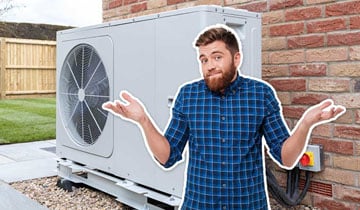
There has been and continues to be a lot of talk around heat pumps being the go-to low-carbon alternative for heating our homes and, to be fair, there’s good reason for that. Heat pumps are one of the most energy-efficient heating systems to use. In fact, according to Money Week, ‘Heat pump installations have risen by 10% every month since the Government's Boiler Upgrade Scheme started offering vouchers worth up to £6,000 in May 2022.’
So, with the installation of heat pumps continuing to grow, we’ve written this heat pump guide article to help you to decide if a heat pump is worth considering for your project and how direct electric heating can play a part. We’ll be answering the following questions:
Heat pumps produce more heat than the energy they use which naturally makes them extremely efficient. There are two efficiency measurements for heat pumps; Coefficient of Performance (COP) and Seasonal Coefficient of Performance (SCOP). The best measurement of efficiency to use for a heat pump is called the SCOP which shows the efficiency of the heat pump throughout the year, taking temperature fluctuations into account, rather than measuring efficiency at a single point of time, which is what COP does. The SCOP is used because heat pumps will experience temperature fluctuations throughout the year which affects performance.
You’ll find that the average SCOP stated by manufacturers is between 3 and 4. This means for each 1kW of electricity put in, you get between 3kW and 4kW of heat out. The SCOP is calculated based on your location and the whole heating system design which would take into consideration the emitter used in the home such as underfloor heating or radiators. It’s worth bearing in mind that to be cost effective to run, and on par or cheaper than a gas boiler, a heat pump needs to be running at a SCOP of around 3.5.
It’s important that you are shown the SCOP prior to any work commencing because it will help you get a clearer idea of what the running cost of the heat pump system will be, and whether it is a viable option for you.
Because of how efficient heat pumps are rated, they are also one of the best systems to install when Primary Energy Rating (an indicator of energy use which is influenced by both fabric and fuel) is concerned. Primary Energy Rating has been included in the latest SAP calculations and the better the rating, the easier it is to comply with Part L of the Building Regulations.

Whilst there is a wider range of heat pumps available world-wide, we are going to focus on the common types found in the UK. These are ground source heat pumps and air source heat pumps.
Ground source heat pumps
A ground source heat pump system utilises natural heat from under the ground and performs the role a boiler would for a traditional central heating system, but it doesn’t burn fuel like a boiler does. The heat from the ground is collected by a mixture of antifreeze and water which circulates through a network of pipes laid underground, it then flows to a heat exchanger inside the property. By using electricity, the fluid is compressed which makes the temperature rise. The high temperature fluid is passed through a heat exchanger to transfer the heat energy to the water in either a hot water cylinder coil or a heating system. Heated water is then transported through the pipework to radiators or an underfloor heating system with any excess warm water being stored in a hot water cylinder.
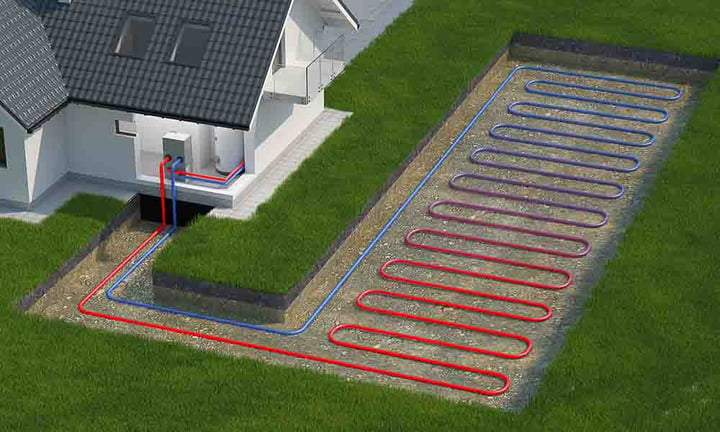
Air source heat pumps
An air source heat pump is very similar to a ground source heat pump but instead of harnessing heat from the ground, it takes it from the air. Think of them like a fridge but in reverse. The heat from the air outside is absorbed by a liquid refrigerant which is then compressed to increase temperature which is then condensed to release the heat. Like the ground source heat pump, this heat is transported via a heat exchanger, through pipework to radiators or underfloor heating and the rest goes straight to the hot water cylinder coil to warm up your hot water tank.
Along with air-to-water heat pumps, there are the less common air-to-air heat pumps which take the heat from the air outside and feed it into the property via fans. However, homes need an air circulation system so the warm air can be moved around, which is unusual in the UK. Air-to-air heat pumps also don’t produce hot water so you’ll need a different system for that, but they can act as an air conditioning unit in the warmer summer months.
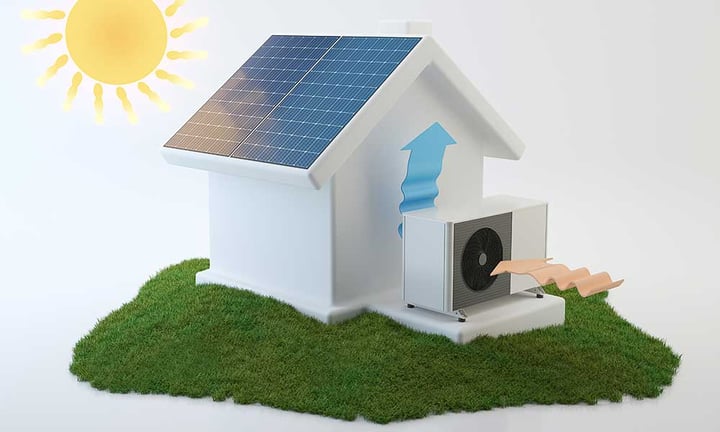
If you are installing any type of heat pump on a domestic property, it is usually considered a permitted development which doesn’t require planning permission. However, there are exceptions which could include if you live in a conservation area or a listed building. Most local councils will be able to advise you of the requirements based on where you live.
Ground source heat pumps
There are two ways in which a ground source heat pump system can be installed, either horizontally or vertically. But you will need a site survey to determine which type of system is best for your home. A horizontal system requires more ground to accommodate two-metre-deep trenches which the pipework will be buried within. A vertical system uses a borehole instead which is drilled to a depth of between 15 – 150 metres and can benefit from higher ground temperatures compared to trenches. When it comes to installation cost, the Ground Source Heat Pump Association suggests indicative costs of ‘…a horizontal GSHP system is likely to be in the range £1,250 – £1,750 per kW of capacity, with that for a vertical borehole closed-loop system in the range £1,750 – £3,000 per kW.’
Air source heat pumps
Air source heat pumps are much less disruptive to install than their ground source counterparts. The unit is usually installed on the rear or the side of the property but do require adequate space around them for the air to circulate. When it comes to the cost of installing one, you can expect to pay anything between £7,000 and £13,000. However, this does not include any grants from the Government.
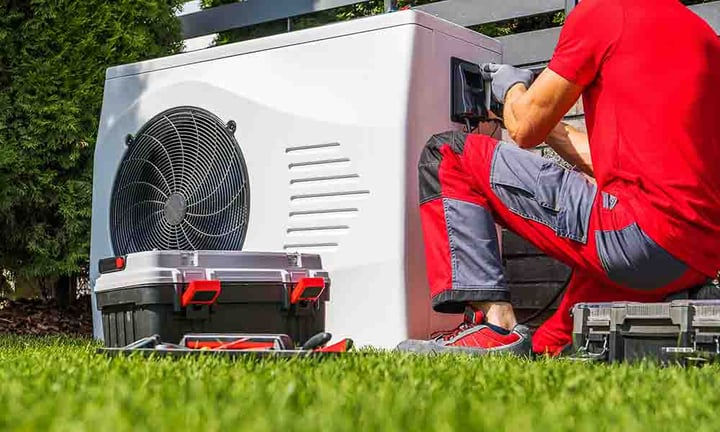
Heat pumps need electricity to work and currently the cost per kWh of electricity is high compared to that of gas. However, with an efficiency of around 300%, heat pumps remain appealing. But there are a multitude of factors that will affect the running cost of a heat pump system and potential savings on your energy bill. These include:
In an example by Which?, they showed that the annual costs of a gas boiler (£1,307.30) vs an air source heat pump (£1,127.10) were not too dissimilar.
However, as energy prices continue to fluctuate over time there is an expectation that heat pumps will not only become the cheapest, it will also be the lowest carbon form of heating available.
A well-designed heat pump system will reduce the heated water temperature as much as possible because the closer the required temperature is to the outside air or ground temperature, the more efficient the heat pump will be. This means a lower running cost for the homeowner.

The Boiler Upgrade Scheme
Launched in April 2022, this government scheme grants homeowners a one-off sum of money to help with the costs of installing a heat pump. The amounts vary depending on the type of heat pump you are looking to install:
Find out more about the Boiler Upgrade Scheme.
Choosing the right installer
When looking for an engineer to install your heat pump make sure that they are a MCS-certified installer. The certification means that they completed the correct training and must follow robust codes of conduct and industry compliance. There are also various approved installer schemes from manufactures and Heat Geek, which should point you in the right direction to a reliable installation and commissioning company.
As well as checking for MCS certification, look at their customer reviews and examples of previous work. Finally, ensure they do their own full heat loss calculations on your specific property, as this is the only way to reliably specify and set up a heat pump to work in the most efficient way possible. Also take time to look at their customer reviews and examples of previous work.
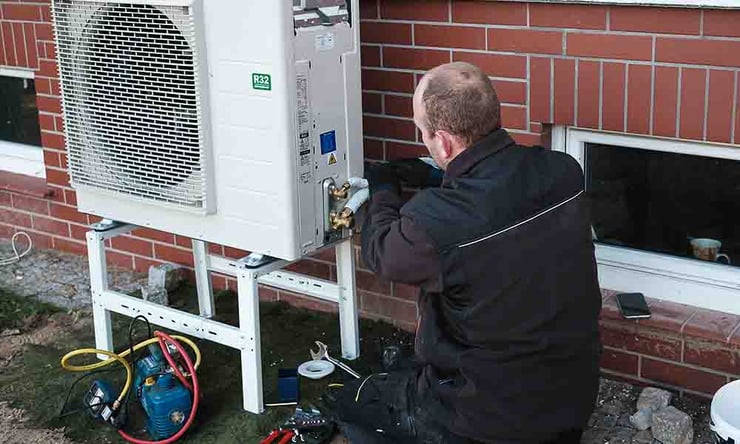
Many installations will use some form of electric water heating as a top up to achieve the desired water temperature and this could be an electric boiler, immersion heater or one of our Micro Electric Boilers. This hybrid solution has the advantage of keeping the heat pump at its optimal efficiency regardless of external conditions whilst maintaining the desired hot water temperature.
The main place that direct electric heating is going to fit into the market is where space is at a premium. This includes renovations where you can’t change the full heating system to suit a heat pump. In this instance a swap for an electric boiler could be the answer. However, if you are renovating the floors then a low-profile electric underfloor heating would be ideal.
For new build projects we have seen a growing trend towards a small heat pump being installed purely for generating hot water, with electric radiators or electric panel heaters been used for space heating. This has helped the developers achieve compliance with Part L more easily. It is also not uncommon to find heat pump installations having a gas boiler installed to act as both a top up during the colder months or as a back up should the heat pump system fail at any point. This can be replaced with an electric boiler or an electric instantaneous hot water heater as a low carbon and often space saving alternative.
Direct electric heating is going to fill the gap where heat pumps either have a low performance or where they can’t be installed practically or affordably. There’s space in the market for both, and in many cases, they will work alongside each other, but the market can’t do without one or the other.
If you have a question about electric heating which isn’t covered in this article, please contact one of the ThermoSphere team who will be happy to help. For questions relating to heat pumps, please visit the MCS website or Heat Geek.
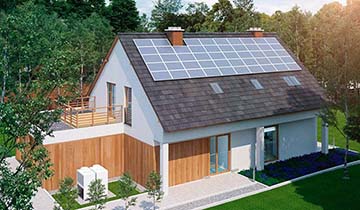
9 min read
If you’re one of over 2 million homes in the UK not connected to a mains gas supply you know the challenges surrounding heating your home. In this...
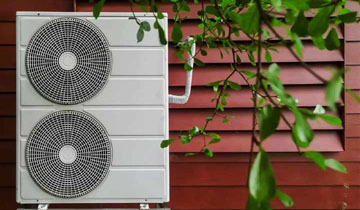
5 min read
If you search for information on heat pumps via Google or any other search engine, you will see a mass of opinion. Some articles claim heat pumps to...
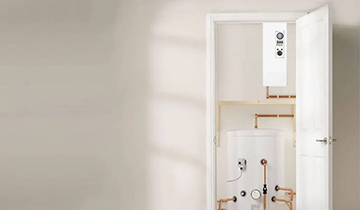
5 min read
James Warlow is an Architectural Technologist living in Norfolk and has a career spanning nearly 47 years in architecture. James lives in a 3-bedroom...